The U.S. President’s Emergency Plan for AIDS Relief (PEPFAR), a landmark global health initiative launched by President George W. Bush in 2003, stands as a testament to the power of foreign aid in combating devastating health crises. Created in response to the global HIV/AIDS epidemic and the prohibitive cost of life-saving antiretroviral therapy (ART) in developing nations, PEPFAR has become one of the most successful public health programs in history.
Over the past two decades, PEPFAR has invested over $120 billion and is credited with saving an estimated 26 million lives worldwide. Its success stems from rigorous monitoring, allowing program managers to tailor strategies to specific country needs. This data-driven approach enabled even severely affected countries to make significant progress against the epidemic.
Unprecedented Cuts Threaten Progress
Despite its remarkable track record and initially bipartisan support, the future of the PEPFAR program is now under grave threat due to sweeping funding reductions initiated by the Trump administration. These cuts are not isolated; they are part of a broader plan that targeted drastically cutting U.S. foreign aid, including eliminating over 90% of USAID’s multiyear contracts and numerous State Department grants, totaling billions in unpaid obligations.
The administration justified these reductions by citing the U.S.’s national debt, arguing African countries should absorb more healthcare costs, and framing foreign aid programs as potentially advancing a “liberal agenda” or being a “waste of money.” However, experts counter that the relatively small amount saved compared to the national debt is negligible, and PEPFAR’s role extends beyond aid, contributing to global stability by preventing health crises that could lead to conflict and collapse.
Immediate and Devastating Impacts
The effects of these cuts and the resulting uncertainty are already being felt acutely on the ground. Funding freezes led to thousands of U.S.-funded programs abroad being halted. Earlier this year, many HIV/AIDS organizations, particularly across Africa, received abrupt emails terminating their contracts with USAID, in some cases signed off with “God bless America.”
Program closures have occurred in countries like Lesotho, Eswatini, and Tanzania, impacting an estimated 350,000 people, including over 10,000 pregnant women who rely on PEPFAR-supported treatment to prevent transmitting HIV to their babies. The scale of the crisis is underscored by estimates from researchers at the HIV Modelling Consortium, who project that the cuts have already led to the deaths of an estimated 70,000 people.
Furthermore, the reductions have reached into the U.S. agencies managing the programs. Cuts at the Centers for Disease Control and Prevention (CDC), part of wider reductions across the Department of Health and Human Services, included personnel working directly on PEPFAR. Reports indicate that all federal experts on HIV prevention in children overseas were fired, alongside numerous epidemiologists crucial to program planning and execution. This dismantling of essential staff and infrastructure is feared to cripple the program’s ability to function effectively, even if some funding remains.
Jeopardizing Future Breakthroughs and Long-Term Goals
The cuts also imperil future advancements in HIV prevention and treatment. PEPFAR was anticipated to play a key role in distributing promising new drugs globally, such as lenacapavir, a new HIV prevention injection offering “virtually complete protection” that could be administered just twice a year. The disruption and uncertainty surrounding PEPFAR’s future now jeopardize the planned rollout of such groundbreaking medications that could significantly accelerate the end of the epidemic.
Political challenges have also eroded the program’s foundation. Bipartisan support for PEPFAR began to wane, culminating in only a 12-month reauthorization in March 2024 instead of the customary five years, despite warnings from former President Bush against abandoning the program he created. Specific controversies, such as funding linked to organizations providing legal abortions, further fueled opposition and demands for program termination.
Experts warn the long-term consequences are dire. Beyond the immediate loss of life, ceasing U.S. support could lead to an estimated additional 565,000 new HIV infections and 601,000 more deaths over the next decade. Filling the resulting funding gap in low and middle-income countries, where PEPFAR often covers a significant portion of national HIV budgets (around two-thirds in many nations), will be extremely challenging, especially as other global donors also face budgetary pressures.
The current trajectory risks reversing decades of hard-won progress against HIV/AIDS, undermining a program widely seen as a rare and clear success story in global public health and foreign policy.




